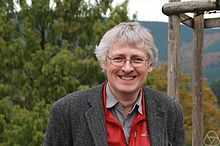Trevor Wooley
From Wikipedia, the free encyclopedia
| Trevor D. Wooley | |
|---|---|
 Trevor D. Wooley | |
| Nationality | British |
| Fields | Mathematician |
| Institutions | University of Bristol |
| Alma mater |
Imperial College London University of Cambridge |
| Doctoral advisor | Robert Charles Vaughan |
| Doctoral students |
Morley Davidson Greg Martin Joel Wisdom Eric Freeman Scott Parsell Mike Knapp Matthew Smith Craig Spencer Sean Prendiville Eugen Keil |
| Known for |
Analytic number theory Diophantine equations Hardy–Littlewood circle method |
| Notable awards |
Fellow of the Royal Society Salem Prize |
Trevor D. Wooley FRS is a British mathematician and currently Professor of Mathematics at the University of Bristol. His fields of interest include analytic number theory, Diophantine equations and Diophantine problems, harmonic analysis, the Hardy-Littlewood circle method, and the theory and applications of exponential sums. He has made significant breakthroughs on Waring's problem, for which he was awarded the Salem Prize in 1998.
He received his bachelor's degree in 1987 from the University of Cambridge and his Ph.D., supervised by Robert Charles Vaughan, in 1990 from the University of London.[1] In 2007 he was elected Fellow of the Royal Society.
Awards and honors
- Alfred P. Sloan Research Fellow, 1993–1995
- Salem Prize, 1998
- Invited speaker, International Congress of Mathematicians, Beijing 2002
- Elected Fellow of the Royal Society, 2007.
- Fröhlich Prize, 2012.
- Fellow of the American Mathematical Society, 2012.[2]
Selected publications
- Trevor D. Wooley, Large improvements in Waring's problem. Ann. of Math. (2) 135 (1992), no. 1, 131—164.
- Trevor D. Wooley, Quasi-diagonal behaviour in certain mean value theorems of additive number theory. J. Amer. Math. Soc. 7 (1994), no. 1, 221—245.
- Trevor D. Wooley, Breaking classical convexity in Waring's problem: sums of cubes and quasi-diagonal behaviour. Invent. Math. 122 (1995), no. 3, 421—451.
- Trevor D. Wooley, Vinogradov's mean value theorem via efficient congruencing. Ann. of Math. (2) 175 (2012), no. 3, 1575–1627.
References
- ↑ Trevor Wooley at the Mathematics Genealogy Project
- ↑ List of Fellows of the American Mathematical Society, retrieved 2013-09-01.
External links
This article is issued from Wikipedia. The text is available under the Creative Commons Attribution/Share Alike; additional terms may apply for the media files.